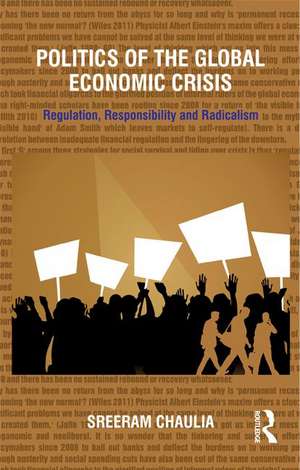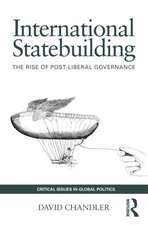Politics of the Global Economic Crisis: Regulation, Responsibility and Radicalism
Autor Sreeram Chauliaen Limba Engleză Hardback – 17 oct 2013
| Toate formatele și edițiile | Preț | Express |
|---|---|---|
| Paperback (1) | 443.65 lei 43-57 zile | |
| Taylor & Francis – 21 ian 2016 | 443.65 lei 43-57 zile | |
| Hardback (1) | 1009.55 lei 43-57 zile | |
| Taylor & Francis – 17 oct 2013 | 1009.55 lei 43-57 zile |
Preț: 1009.55 lei
Preț vechi: 1231.17 lei
-18% Nou
Puncte Express: 1514
Preț estimativ în valută:
193.24€ • 209.97$ • 162.43£
193.24€ • 209.97$ • 162.43£
Carte tipărită la comandă
Livrare economică 21 aprilie-05 mai
Preluare comenzi: 021 569.72.76
Specificații
ISBN-13: 9780415736282
ISBN-10: 0415736285
Pagini: 300
Dimensiuni: 138 x 216 x 24 mm
Greutate: 0.72 kg
Ediția:1
Editura: Taylor & Francis
Colecția Routledge India
Locul publicării:Oxford, United Kingdom
ISBN-10: 0415736285
Pagini: 300
Dimensiuni: 138 x 216 x 24 mm
Greutate: 0.72 kg
Ediția:1
Editura: Taylor & Francis
Colecția Routledge India
Locul publicării:Oxford, United Kingdom
Public țintă
PostgraduateCuprins
List of Abbreviations. Foreword Andrew Walter. Acknowledgements. Introduction 1. State of the State 2. Oh, those Bankers! 3. ‘Great Recession’ and the Rising Others 4. Groups of Hope and Despair 5. Trade Wars and Alliances. Epilogue. Bibliography. About the Author. Index
Recenzii
‘Politics of the Global Economic Crisis is vital reading for the reinvention of democracy.’ — Vandana Shiva, Board Member, International Forum on Globalisation, San Francisco; and Director, Navdanya, New Delhi
‘In these perceptive and provocative essays . . . Sreeram Chaulia analyses extant global economic and geopolitical trends and India's response to them. [He] draws attention to the challenges facing India as its economy rises and re-integrates with the world economy.’ — Sanjaya Baru, Director for Geo-Economics and Strategy, International Institute for Strategic Studies, London
‘Sreeram Chaulia's new book on the global economy is a desperately needed antidote to the ‘economic reform’ packages that Washington, Wall Street and the World Bank have put forward . . . [It will] serve as an indispensable blueprint for the people-centered economy that the Occupy Movement and its successors have championed.’ — John Feffer, Co-Director, Foreign Policy in Focus, Institute for Policy Studies, Washington DC
[This book] highlights key aspects of the current crisis, addressing not only its political and economic dimensions, but also the responses from mass movements of Occupy and Indignados . . . [making] a very important contribution.’ — Pablo Solon, Executive Director, Focus on the Global South; and former Ambassador of Bolivia to the United Nations
‘In these perceptive and provocative essays . . . Sreeram Chaulia analyses extant global economic and geopolitical trends and India's response to them. [He] draws attention to the challenges facing India as its economy rises and re-integrates with the world economy.’ — Sanjaya Baru, Director for Geo-Economics and Strategy, International Institute for Strategic Studies, London
‘Sreeram Chaulia's new book on the global economy is a desperately needed antidote to the ‘economic reform’ packages that Washington, Wall Street and the World Bank have put forward . . . [It will] serve as an indispensable blueprint for the people-centered economy that the Occupy Movement and its successors have championed.’ — John Feffer, Co-Director, Foreign Policy in Focus, Institute for Policy Studies, Washington DC
[This book] highlights key aspects of the current crisis, addressing not only its political and economic dimensions, but also the responses from mass movements of Occupy and Indignados . . . [making] a very important contribution.’ — Pablo Solon, Executive Director, Focus on the Global South; and former Ambassador of Bolivia to the United Nations
Notă biografică
Sreeram Chaulia is a Professor and Dean at the Jindal School of International Affairs, O. P. Jindal Global University, Sonipat, India. He is the first B. Raman Fellow for Geopolitical Analysis at the strategic affairs think tank, The Takshashila Institution. He is also a leading opinion columnist for Indian newspapers — The Economic Times and The Asian Age — on global issues, and a commentator on international current affairs on radio and television. He has been a guest of the Government of Mexico for the G-20 Summit and the Government of Iran for the Non-Aligned Movement Summit. He is a contributing editor for People Who Influenced the World over the Past 100 Years (ed. Peter Murray, 2005) and also authored International Organizations and Civilian Protection: Power, Ideas and Humanitarian Aid in Conflict Zones (2011).
Descriere
This book is an important commentary on the worst global economic crisis since the Great Depression and the first in-depth analysis of the crisis from a political scientist’s lens. Instead of offering technocratic solutions, it argues for more state regulation of finance, greater state responsibility towards society, and more radical social movements to fight for economic justice.
























